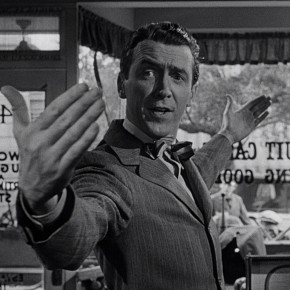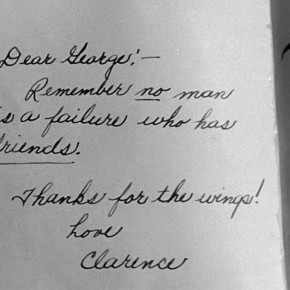
It’s that time of year again! The time when you break out those old classic Christmas movies and watch them by the fireside while drinking hot cocoa and basking in the nostalgia of the season. And there’s perhaps no more quintessential Christmas movie than Frank Capra’s “It’s a Wonderful Life” – a must see.
Before seeing it recently (on the big screen, no less), I had always remembered it as a movie that gives you that warm assurance that life is worth living. George is a man at the end of his rope when he’s given a divine vision of how much his seemingly small life matters to the town of Bedford Falls. There is hope beyond despair because you’re more important than you realize, etc. It’s still an inspiring message almost 70 years later.
 Yet there’s more to this feel-good movie than I realized. Beyond the story of George and his depression there is a powerful treatise on grace in practice and its surprising cosmic effects (see also Ron’s insightful piece on a NY Times review of the movie).
Yet there’s more to this feel-good movie than I realized. Beyond the story of George and his depression there is a powerful treatise on grace in practice and its surprising cosmic effects (see also Ron’s insightful piece on a NY Times review of the movie).
Without making him a saint (he’s far too human for that), in many ways George Bailey is a walking embodiment of grace. Despite his woe-is-me depression over his lot in life, whenever the situation of need presents itself, George spontaneously puts the concerns of others ahead of his own in a sacrificial way: not thinking of himself in any way. When his kid brother falls in the pond (spoilers!), he jumps in to save him, losing his hearing in his left ear. When his father dies, George foregoes his world tour to save the unprofitable Building and Loans company. He foregoes college a second time so that his brother can have a better life at the glass factory. When a bank run threatens the very business he hates and the long-term security of the town he’s desperately trying to leave, he gives of his own wedding money to keep things afloat. Rather than seeking personal profit, George gives out risky loans so that others can realize their dream of owning a home.
In short, George is a walking, talking, example of grace in practice, giving of himself for others. Yes, the costs he suffers for such actions are too much for him to bear (or anyone else, for that matter). And yes, he has many second thoughts and regrets. But in the moment all that matters to him is the need of others.
 But there are two points which are the most interesting to me about this depiction of grace. The first, is that George’s self-giving love is the very thing that keeps the world of Bedford Falls from spinning off its axis. When we see what would have happen if George had never lived – or without his interventions of grace – the town is lost to the control of the ruthless, graceless capitalist, Henry F. Potter. The mainstay businesses are replaced by more profitable stores like casinos and other establishments of “riotous living”. The two name itself becomes Potterville. Setting aside the highbrow expectations of plausibility and nuance, this venture into bizarro-Bedford Falls is both profound and entertaining. Without the unexpected interventions of grace, the world quickly goes to hell in a hand-basket. Grace is an interruption that disrupts the karmic (capitalist?) order of the world.
But there are two points which are the most interesting to me about this depiction of grace. The first, is that George’s self-giving love is the very thing that keeps the world of Bedford Falls from spinning off its axis. When we see what would have happen if George had never lived – or without his interventions of grace – the town is lost to the control of the ruthless, graceless capitalist, Henry F. Potter. The mainstay businesses are replaced by more profitable stores like casinos and other establishments of “riotous living”. The two name itself becomes Potterville. Setting aside the highbrow expectations of plausibility and nuance, this venture into bizarro-Bedford Falls is both profound and entertaining. Without the unexpected interventions of grace, the world quickly goes to hell in a hand-basket. Grace is an interruption that disrupts the karmic (capitalist?) order of the world.
Additionally, George’s one-way-love to the people of Bedford Falls is not an unrequited, uni-vocal love. His grace is not given in vain, but is return to him 10 fold in his hour of need. George’s long-suffering life of grace has created a loving community which supports him when the tables turn and he desperately needs help. Grace “works”, without exception! It cannot help but have an effect on the recipient. The act of grace for the unexpecting (i.e. unworthy) recipient creates a spontaneous, reciprocal response of thankfulness, loyalty, and love.
In order words, “It’s a Wonderful Life” illustrates perfectly how grace (divine or human) has a “domino effect” to transform everything it touches. It strengthens the weak hands and make firm the feeble knees (Is. 35:3), bringing light where there was once darkness and life where there was death. Perhaps it’s no accident the movie ends with an impromptu rendition of “Hark the Herald Angels Sing” and “Auld Lang Syne”…

COMMENTS
5 responses to “Grace in Practice in “It’s a Wonderful Life””
Leave a Reply













Wonderful post, Todd! This is one of my favorite movies and we do watch it almost every year.
And if I may be so bold, here is my favorite “alternate ending” which wraps things up UNgracefully.
http://youtu.be/168GuF2dhww
Merry Christmas!
Gee, the guy who runs the Savings & Loan isn’t a capitalist? You must have seen a different film. Thanks for the agitprop.
Sure, I could have been more precise in my definition! But there’s certainly a contrast made between both the Baileys and Potter, specifically in their unwillingness to make personal profit. Yes, he gives out loans, but the goal seems to be something more than making money. This is the very point which Potter accuses of the Sr. Bailey, that he never made a dime – to which George freely admits that his Dad wasn’t a businessman!
If anything, the B&L exists to promote community well-being, which is the emphasis of his speech to the B&L board of trustees. I won’t go so far to call him a socialist, but he’s certainly not like any capitalist I’ve read.
I enjoyed your post and also love the movie. I may be misunderstanding you, but get the impression you are saying capitalism is bad? I think capitalism is good and has done more to lift people out of poverty than anything else — “aid” can only go so far. I think the character Potter is bad because he is a just miserable old man who puts making money above all, not because he is a capitalist. In fact many people who make a lot of money are quite generous. Happy New Year!
Lisa, thanks for the clarifying question. To explain a bit further the throwaway line above, I’m suggesting that Grace (or gift) contravenes the principles of capitalism, which by-and-large deride charity and require that one act according to one’s own self-interest…i.e.. strict capitalism requires that one act as Potter does, who “puts making money above all”.